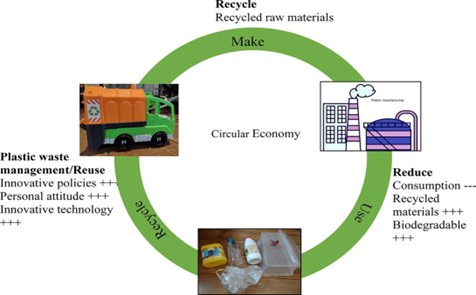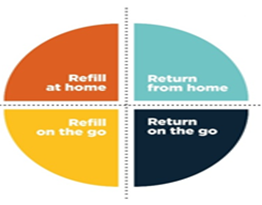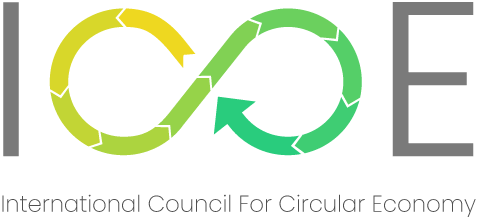Achieving circularity in cities through plastic waste management is crucial. This involves reducing plastic use, promoting reuse, and enhancing recycling systems to prolong the life cycle of plastic materials within the economy. By minimizing waste, decreasing dependency on new materials, and exploring innovative ways to repurpose plastic waste, this approach not only benefits the environment but also opens doors to new economic prospects. Let’s work together towards a sustainable future.
In India, the key to enhancing plastic recycling lies in strategic policy reforms and government initiatives. By enforcing stricter regulations on plastic product usage and disposal, the government can drive industries and consumers towards sustainable practices. Measures like imposing higher taxes on single-use plastics, implementing extended producer responsibility laws, and setting ambitious recycling targets can pave the way for a greener future.
Moreover, the realm of plastic recycling is witnessing significant advancements in technology. Innovations like chemical recycling, pyrolysis, and advanced sorting systems and mechanical recycling are revolutionizing the recycling industry in India. These technologies enable the processing of a wider array of plastics, resulting in higher purity levels in recycled materials. Not only do these innovations boost the efficiency of recycling processes, but they also play a crucial role in reducing the environmental impact by diverting more plastic waste from landfills and incineration.
By embracing these strategies and technological advancements, India can make substantial progress towards a more sustainable and eco-friendly approach to plastic recycling.
Focus
Driven Recycling Programs
Addressing plastic waste effectively requires community-driven recycling programs. These initiatives involve local residents, businesses, and organizations collaborating to collect, sort, and recycle plastic waste. By engaging the community in recycling, these programs alleviate pressure on municipal waste systems and cultivate environmental responsibility.
The success of such programs hinges on active individual and
group involvement. Establishing collection points in convenient locations,
offering resources for segregation, and incentivizing participation can
significantly boost recycling rates. Empowering communities to manage their
waste not only diminishes plastic waste in landfills and oceans but also
nurtures a sustainable and environmentally conscious culture.
Enhancing Plastic
Recycling in India
Policy reforms and government initiatives play a crucial role in
advancing plastic recycling in India. By implementing stricter regulations on
plastic product usage and disposal, the government can drive industries and
consumers towards more sustainable practices. This includes measures like
imposing higher taxes on single-use plastics, enforcing extended producer
responsibility laws, and setting ambitious recycling targets.
Innovations in recycling technology offer promising solutions
for enhancing plastic recycling efficiency. Technologies such as chemical
recycling, advanced mechanical recycling, and advanced sorting systems enable
the recycling industry to process a wider range of plastics and achieve higher
purity levels in recycled materials. These advancements not only boost
recycling efficiency but also help reduce environmental impact by diverting
more plastic waste from landfills and incineration.
Public involvement and education are key pillars in the fight
against plastic waste. Raising awareness about the detrimental effects of
plastic pollution on the environment and human health is essential. Educating
individuals about the significance of reducing, reusing, and recycling plastic
is crucial to minimizing its environmental footprint. Together, through
informed actions and sustainable practices, we can make a positive impact on
plastic recycling in India.
Challenges
and Potential Solutions to Plastic Pollution
With the informal sector playing a crucial role in recycling
efforts in India, it’s essential to address their involvement systematically.
Integrating informal waste pickers into the formal recycling system through
training, resources, and fair compensation can enhance the efficiency of
plastic waste management.
To tackle financial and logistical obstacles, implementing
extended producer responsibility (EPR) programs is key. This approach holds
manufacturers accountable for collecting and recycling their products, easing
the burden on municipalities and encouraging sustainable packaging practices.
Collaborating with private sector partners and investing in waste management
technologies can also help overcome challenges like inadequate infrastructure
and transportation.
In India, logistical hurdles such as insufficient collection and sorting facilities hinder effective plastic waste recycling. Enhancing infrastructure and logistics is vital to streamline the recycling process, boost recycling rates, and minimize environmental impact.
Among other strategies include
Reducing Plastic Consumption:
● Supporting the development and use of sustainable packaging options such as biodegradable or compostable materials to promote eco-friendly packaging.
● These materials offer a viable alternative to traditional plastics, reducing landfill waste and reliance on fossil fuels. The market for these sustainable options is growing, with the compostable packaging market expected to reach $74.01 billion in 2023 and projected to grow further.
● To encourage the use of reusable alternatives like bottles, food containers, and shopping bags, it’s important to highlight the benefits and make it easy to adopt these practices. Focus on convenience, cost-effectiveness, and the positive environmental impact.
Educating and Raising Awareness:
Make Reusable Alternatives Convenient and Accessible:
● Ensure that reusable shopping bags, water bottles, and food containers are readily available at stores, offices, and homes.
● Consider providing incentives for using reusable alternatives, such as discounts or rewards.
● Encourage businesses to offer reusable options and accept customers’ own containers.

Redesign products and packaging:
● Focus on designing products and packaging that can be easily reused, refilled, or recycled
● Several initiatives and businesses in India are offering refill stations for household products as a way to reduce plastic waste and promote sustainability. These include in-store vending machines, mobile refill trucks, and online platforms connecting consumers with refill services.
● Bare Necessities offers a full range of zero waste products, including starter kits, skincare, personal care items, and gift bundles. Their products are designed to be reusable, recyclable, or compostable, minimizing waste and promoting sustainable living. They emphasize ethical sourcing, local manufacturing, and responsible end-of-life solutions for their products.
Starter Kits:
Zero Waste Starter Kits:
● The range includes reusable straws, cutlery, and other items designed to replace single-use plastics.
Gift Bundles:
● They have curated gift bundles for different occasions, focusing on zero-waste and handcrafted items.
● Key Features of Bare Necessities’ Zero Waste Approach: Ethical Sourcing:’
● They prioritize sourcing materials ethically and locally.
Responsible Manufacturing:
● They focus on responsible manufacturing practices that minimize waste and environmental impact.
No Packaging Footprint:
● They strive to eliminate packaging waste associated with their products.
End-of-Life Solutions:
● They aim for products with a responsible end-of-life, such as being biodegradable or recyclable.
● Bare Necessities aims to make zero waste living more accessible and convenient with their diverse range of products and initiatives.

Reuse and Repurpose:
● Establish reuse networks: Create platforms for selling, donating, or exchanging used plastic items to extend their lifespan and prevent them from becoming waste, according to the U.S. EPA.
● Promote refillable systems: Encourage businesses to offer products in refillable containers instead of single-use packaging, says the UNEP.
Reuse Models and Global Policies are driving change
The need for a shift from single-use packaging is urgent! Reuse models are emerging as a vital solution to transition towards a circular economy. These systems reduce waste and position businesses to align with evolving regulatory requirements and consumer demand for sustainability.
To make reuse work at scale, businesses are adopting one or more of the following models:
1. Refill at Home: Enables consumers to refill products, like cleaning solutions or beverages, using concentrates or bulk containers, minimizing packaging waste. Example MIWA (Czech Republic)
2. Refill on the Go: Consumers refill containers at in-store dispensers or dedicated refill stations, a solution gaining traction in food, beverage, and personal care sectors. Example: Unilever’s Refill Stations
3. Return from Home: Packaging is picked up directly from consumers’ homes, often integrated with e-commerce deliveries for maximum convenience.
4. Return on the Go: Consumers return reusable packaging to stores or collection points. Coca-Cola’s Refillable Glass Bottles
While these models offer clear environmental benefits, they are becoming a business necessity due to regulatory pressure. Regulations worldwide are pushing the packaging industry towards reuse to reduce waste and environmental impact
● European Union: The Packaging and Packaging Waste Regulation (PPWR) mandates ambitious reuse targets, aiming for a 50% reduction in single-use packaging by 2030.
● United Nations: The Plastics Treaty emphasizes reuse as a critical strategy for reducing plastic pollution.
The shift to reusable packaging requires collaboration across the value chain. Businesses must evaluate which reuse model aligns best with their products and operational structure while ensuring compliance with local and global regulations. By adopting these models, companies can lead the charge toward a sustainable future while staying ahead in a rapidly changing policy landscape.

True circularity doesn’t begin with waste; it begins with design and behavior. To create a sustainable loop, we must prioritize:
● Reducing plastic production at the source
● Scaling reusable and refillable packaging systems
● Designing products and packaging for long life and multiple-use cycles
● Supporting centralized or decentralized, community-based waste management models
● Using non recyclables plastics in applications like road construction
The city of Indore is a fine example of this
Indore manages plastic waste through a comprehensive system involving segregation, processing, and recycling. The city has a centralized waste processing facility that includes a plastic waste management unit, where plastic is converted into pellets or even fuel. They also focus on source segregation, door-to-door collection, and even using plastic for road construction
The project included various units such as organic waste processing, material recovery, plastic waste collection and processing, reverse vending machines, and a plastic fuel conversion unit. The implementation resulted in the production of high-quality compost, proper disposal of plastic waste, and the transformation of the landfill site into a beautiful garden. The project also contributed to environmental sustainability and efficient waste management practices in the city.
CONCLUSION
In conclusion reduction in the use of plastic can be achieved, e.g., by redesigning the way in which products deliver their function to society, e.g., substituting dry products for liquefied ones so we do not need to transport water (and the products can then be packed in simpler materials).
Extended Producer Responsibility (EPR) is the concept that brands, plastic packaging producers and importers should take responsibility for the plastic they put into a market across its entire lifecycle. EPR policies are based on the “polluter pays” principle and are generally implemented by governments via a set of rules and targets.
EPR programs take one of two forms: those with mandatory targets and penalties for not meeting targets; and those with non-binding targets but with a legal requirement for brands to report on their mitigation performance.
India’s EPR Framework: EPR rules under the Plastic Waste Management (PWM) Act mandate businesses to adopt reusable packaging. The Packaging Reuse target starts at 10% or 70%, depending on the volume of packaging.
The inclusion of informal waste system into the mainstream system is underway and subsequently would be able to improve better strategies of waste management and circular economy
These could be even linked to higher rates of resource recovery, fewer negative environmental impacts, and more possibilities for the informal sector to generate income.
In that respect, the further development of more inclusive and successful policies will pave the road for India into a sustainable and circular economy based on the indication of collaboration between formal and informal systems of waste management.
Reorienting will be needed forshifting the market towards sustainable alternatives, which will require a shift in the way products and packaging are produced, consumer demand, regulatory frameworks and costs. Finally, as a complement to the other solutions.
It is important of ensuring that where plastics are produced, they are designed to be recyclable in the market where they are sold and that waste management and the recycling market become more viable ventures.
These solutions are evolving and that a systems change, underpinned by the necessary regulatory instruments, will result in a range of economic benefits and reduce damage to human health, the environment induce circular practices and the climate of our cities to make them livable and sustainable.
References
● https://www.banyannation.com/blog/circular-economy/
● https://www.tastingtable.com/773695/coca-cola-wants-you-to-refill-your-soda-bottles-heres-how-it-will-work/
● https://www.unilever.com/reuse-refill-rethink-plastic/
● https://www.miwa.eu/https://www.miwa.eu/

